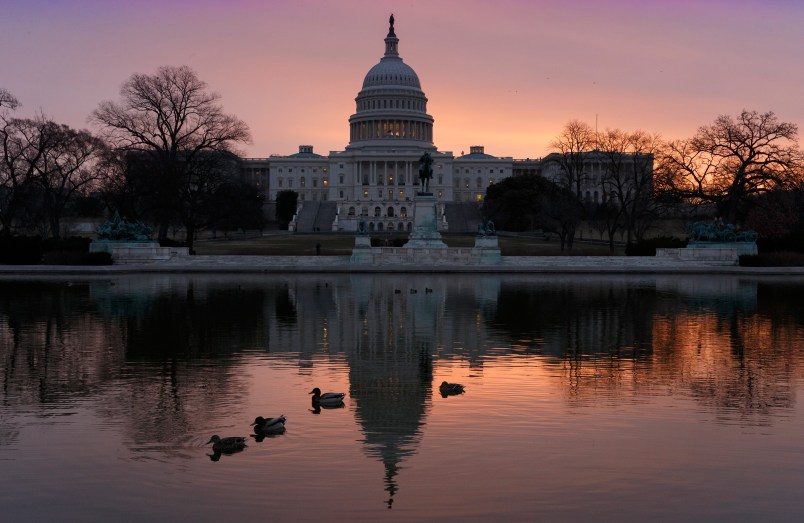Cold weather has an acute tendency to bring out climate change deniers in full force, and the brutal winter that the U.S. Northeast just faced gave opponents of the broad scientific consensus plenty of opportunities to grandstand.
In fact, scientists have long warned that extreme, polarized weather patterns would result from climate change. Saying climate change isn’t real because it’s cold outside is like saying the sun isn’t real because it’s dark outside. Between 97 and 98 percent of climate scientists believe climate change is real and caused by human activities such as burning fossil fuels, according to numerous studies. A new report released Monday by the Intergovernmental Panel on Climate Change (IPCC) found that climate change is causing “severe, pervasive and irreversible” consequences for the environment and poses a threat to food stocks and global security.
The most prominent climate change deniers in the United States belong to the Republican party, which stands alone among powerful political parties around the world in wholly rejecting the scientific consensus. Although they all have a fondness for mocking Al Gore, the deniers come in different flavors and with different levels of sophistication.
Here are the four main varieties.
Climate Truthers
The most ardent brand of deniers, the Truthers say climate change is a gigantic hoax — a conspiracy concocted and fueled by left-wing pseudo-scientists in an attempt to perpetuate more government control over the economy. They’re generally distrustful of scientists — especially international scientists — and contend that the IPCC (and the United Nations more broadly) is out to harm the United States.

The chief example of this kind of denier is Sen. Jim Inhofe (R-OK), a senior member of the Environment & Public Works Committee, who has labeled human-caused climate change “the greatest hoax ever perpetrated on the American people.” He’s well positioned to be its next chairman if Republicans win control of the Senate in November.
Climate Coolers
The Coolers insist that the earth isn’t warming — it’s cooling! They often point to some news clippings from the 1970s when some scientists warned that overall global temperatures were falling. What the Coolers gloss over is the fact that it was a minor contingent of scientists and nothing like the overwhelming consensus that exists within the community today.

One example is Rep. Steve Scalise (R-LA), the chairman of the influential and deeply conservative Republican Study Committee. “In fact,” he said in 2012, “recent scientific data shows that the earth is currently in a cooling period, and it’s predicted that it will continue to cool over the next 20 years.” (It’s unclear what scientific data he was referring to.)
Climate Biblicists
This brand of denalism is rooted in the Biblical premise that only God can change the climate, and it’s folly for humans to suggest they possess such a capability. The Biblicists couch their view in humility and religious devotion.

A prime example is Rep. John Shimkus (R-IL), the chairman of the House Energy & Commerce subcommittee on the environment. “I do believe in the Bible as the final word of God. And I do believe that God said the Earth would not be destroyed by a flood,” Shimkus told Politico in 2010, on the topic of climate change.
Climate Dodgers
The most sophisticated brand of climate change deniers, the Dodgers don’t attempt to refute the scientific consensus; they just insist that scientists remain divided on what’s causing the phenomenon, so there’s no point changing policy over it. It’s a clever equivocation, because just about any scientific theory — evolution, for instance — has some skeptics. There is no such thing as absolute science. The Dodgers aim to downplay the sweeping consensus and exploit the fact that not every climate scientist is on the same page. (True — just 97 to 98 percent.)

Dodgers tend to occupy the highest ranks of GOP leadership. “I don’t think there’s any doubt that we’ve had climate change over the last 100 years,” Speaker John Boehner (R-OH) told USA Today in 2012. “What has initiated it, though, has sparked a debate that’s gone on now for the last 10 years. … I don’t think we’re any closer to the answer than we were 10 years ago.”
In fact, the last decade has hardened the scientific consensus surrounding human-caused climate change with better models and more accurate data. The tangible consequences — such as extreme weather, melting ice caps, rising sea levels and droughts — have either been accurate or worse than early projections, and future projections under the status quo are more dire.
“Nobody on this planet is going to be untouched by the impacts of climate change,” IPCC chair Rajendra Pachauri told reporters in Japan.






